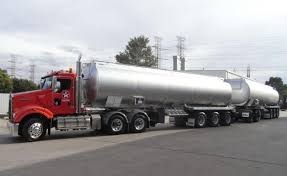The Federal Government has stopped fuel tankers from moving at night as part of new safety measures in the petroleum transport sector. This was announced by the Nigerian Midstream and Downstream Petroleum Regulatory Authority (NMDPRA) during a sensitisation programme held on Wednesday in Lagos.
The Chief Executive of the NMDPRA, Farouk Ahmed, who was represented by the Executive Director for Health, Safety, Environment and Community, Dr Mustapha Lamorde, said the new rule aims to reduce the number of deadly accidents involving petroleum tankers across Nigeria.
According to the directive, fuel trucks must now operate only between 6 am and 6 pm. “There should be no night driving. Anyone caught violating this rule will face sanctions,” Lamorde said. He noted that the decision follows a pattern of tragic incidents in recent years involving fuel tankers that exploded or caused fatal crashes while moving at night.
Also speaking at the event were representatives from the Petroleum Tanker Drivers (PTD) of NUPENG, the National Association of Road Transport Owners (NARTO), the Federal Road Safety Corps (FRSC), and other stakeholders. Together, they backed the government’s move and encouraged compliance among their members.
Dr Lamorde revealed that the ban on 60,000-litre tankers is already in effect, and that no truck will be allowed to load more than 45,000 litres of petroleum by the last quarter of 2025. “The lower the volume, the better the control and response in case of accidents,” he said. A 13-member technical working group has been set up to monitor safety enforcement and make additional recommendations.
To ensure safety, the NMDPRA has introduced a 10-point checklist for truck operators. The checklist covers truck roadworthiness, driver health, and proper safety tools on board. Also, all petroleum tankers are now required to be colour-coded and clearly branded to improve identification and enforcement. In addition, trucks must be fitted with anti-spill kits to prevent fuel loss or explosion during an accident.
The Zonal Chairman of the PTD in Lagos, Comrade Gbolahan, warned drivers to avoid overloading and reckless driving. “We support these measures and urge all drivers to comply. This country no longer wants high-capacity loading,” he said. He also reminded drivers to take care of their health and use the health insurance coverage available to them. “If you feel sick, go to the hospital. Don’t pay from your pocket. You are insured,” he added.
The National Operational Coordinator of NARTO, Dr Kassim Ibrahim, praised President Bola Ahmed Tinubu and the NMDPRA for prioritising driver safety. “This is the first administration to take such bold steps. We support it fully,” he said. He urged drivers to avoid alcohol and overspeeding, saying, “If you go slowly, you will arrive safely. If you rush, you may not get there.”
From the FRSC, Assistant Corps Commander Hyginus Omeje advised tanker drivers to adopt defensive driving. “The best driver is the one who gets to his destination safely, not the one who overtakes carelessly,” he said. Omeje added that over 80 per cent of crashes in Nigeria are caused by human error. He stressed that each driver must take personal responsibility for safety and not rely on other road users.
Omeje also urged NARTO to ensure that speed-limiting devices are installed in all trucks. “Trucks should not go beyond the regulated speed limits. Obey traffic laws. Patience can save your life,” he said.
These measures are part of a wider national effort to reduce fatal road accidents and improve safety in the transportation of petroleum products. Industry observers say these new rules, if enforced properly, could save lives and reduce losses caused by accidents involving fuel tankers.
